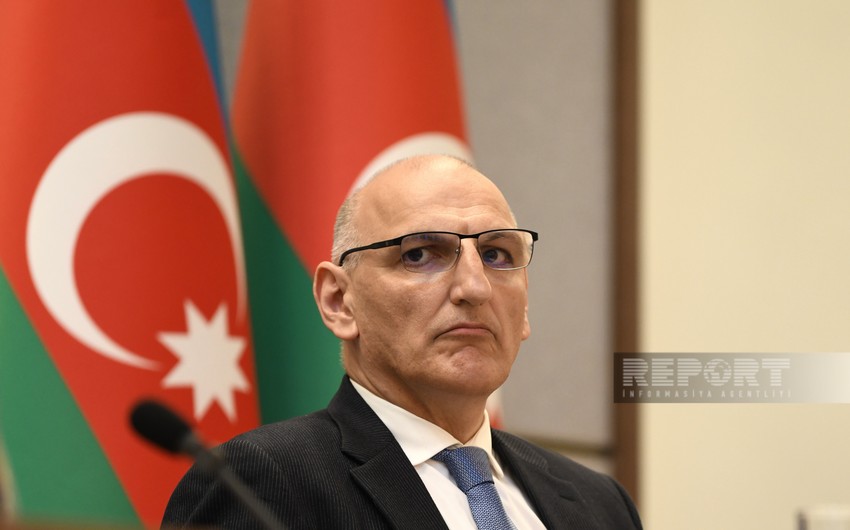Azerbaijan considers Armenia's proposal to sign the peace agreement in its current incomplete form as clearly unrealistic, unacceptable and deliberately misleading, representative of the president of Azerbaijan on special assignments Elchin Amirbayov told Berliner Zeitung, according to Report.
Responding to a journalist's questions of how Baku views the statement by the Armenian ambassador to Germany that Armenia is ready to sign a peace agreement with Azerbaijan as early as tomorrow, Amirbayov emphasized that he strongly doubts the sincerity of this statement.
"Suggesting that a peace agreement in its current incomplete form could be signed tomorrow is clearly unrealistic, unacceptable and deliberately misleading. There are still very important issues in the draft peace agreement that have to be fully addressed. Otherwise, the agreement would be half-baked and deficient," Amirbayov said.
He said most important stumbling block on the road to peace deal today is the territorial claim still embedded in current Armenian constitution on the territory that is internationally recognized as Azerbaijani.
"Ignoring this problem would amount to ignore the elephant in the room," he said.
Without a constitutional amendment in Armenia, this won’t be possible, he said. If a new government in Armenia were to come to power, they could decide that the peace agreement contradicts the Armenian constitution. Since their constitution has a supreme legal force and holds more legal authority than a peace agreement, a new government could declare the agreement invalid.
Amirbayov said most important stumbling block on the road to peace deal today is the territorial claim still embedded in current Armenian constitution on the territory that is internationally recognized as Azerbaijani.
"Ignoring this problem would amount to ignore the elephant in the room. I believe Armenia wants to mislead the international community, creating the impression that it is constructively engaged in the peace process but in reality Armenia procrastinates and leads the peace process to a dead-end," he said.
"In my view, Armenian willingness for peace has even declined recently. They have realized the extent to which the U.S., the European Union, and some EU member states are providing Armenia with diplomatic, economic, military, and other support. Armenia’s militarization, including arms deliveries from countries like France, undermines the prospects for peace. Armenia is now in a comfort zone where peace with Azerbaijan doesn’t seem to be a priority," he said.
Responding to a journalist's question about whether the parties agreed to exclude the issue of opening the Zangazur corridor from the peace agreement in order to accelerate the achievement of results, and whether it is possible to similarly postpone amendments to the Armenian Constitution for the period after signing the peace agreement, Amirbayov said it is absolutely wrong to draw a parallel between these two issues, as they are completely different in their significance for achieving lasting peace.
"Territorial claim of Armenia to Azerbaijan has been from day one the root cause of the conflict and needs to be addressed once and forever. While we respect the desire for a peace agreement as soon as possible, our main goal is that peace should be lasting and irreversible. Without a constitutional amendment in Armenia, this won’t be possible. If a new government in Armenia were to come to power, they could decide that the peace agreement contradicts the Armenian constitution. Since their constitution has a supreme legal force and holds more legal authority than a peace agreement, a new government could declare the agreement invalid. In short, we don’t want peace solely with Prime Minister Pashinyan," Amirbayov said.
He noted that Azerbaijan cannot leave any legal loophole that could lead to the revival of the conflict in the future. "As long as the root cause of the conflict remains unaddressed, we can’t be satisfied with any peace agreement. And we won’t sign something just to please the outside world," he said.
Regarding the Zangazur Corridor between the two parts of Azerbaijan, Amirbayov said Baku still strongly supports this idea.
He noted that however by agreeing to move this issue outside the framework of the peace agreement, Azerbaijan was motivated by the desire not to give additional reasons for our ill-wishers to use the unresolved nature of this question to criticize the Azerbaijani side as undermining overall progress in negotiations on the peace agreement.


 https://static.report.az/photo/7c0ca348-ed21-3fa4-b028-7fcbc3cf05e6.jpg
https://static.report.az/photo/7c0ca348-ed21-3fa4-b028-7fcbc3cf05e6.jpg

